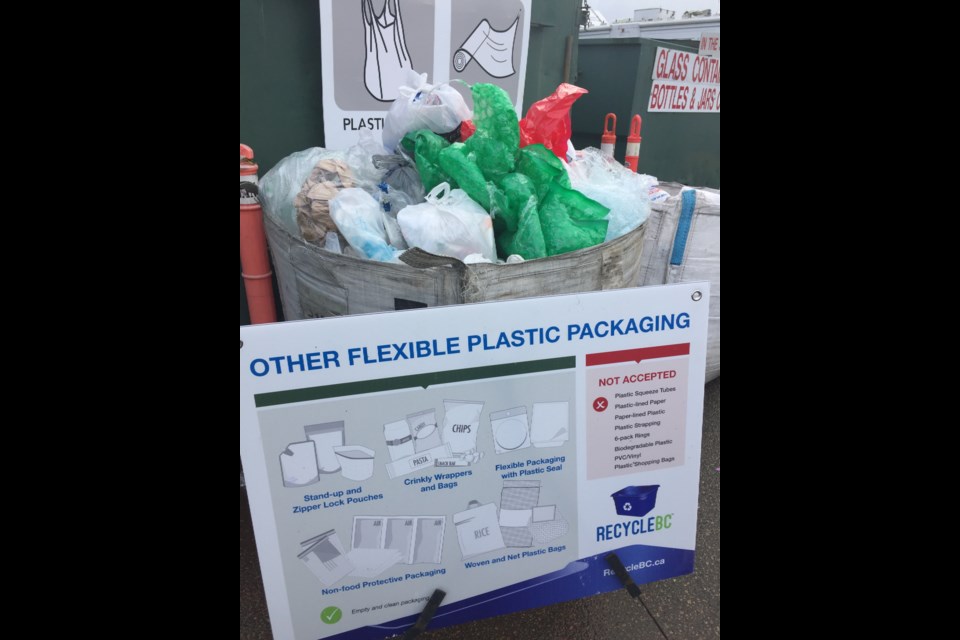New Westminster’s recycling depot is leaving town in 2020.
At a closed meeting in February, city council agreed to participate with Tri-Cities municipalities and Metro Vancouver in the new Coquitlam transfer station and recycling depot that’s being built on the former Coquitlam landfill site at 995 United Blvd. The layout of the future New Westminster Aquatics and Community Centre facility prevents the recycling depot from staying at its current location at Sixth Avenue and McBride Boulevard.
Kristian Davis, the city’s supervisor of solid waste and recycling, said residents will be able to recycle more items than what are currently accepted at the city’s depot, including electronics. They’ll also be able to pay to dispose of items, such as mattresses and garbage, at the transfer station.
“The added five minutes’ drive time, if you are coming from somewhere further west of the depot, is probably not too cumbersome when you think of the new facility being able to accept far more items and being a one-stop shop rather than having to go to multiple locations,” he said.
A 2017/2018 survey of about 200 patrons of the recycling depot found that 77 per cent of respondents frequent the recycling depot regularly, with 37 per cent visiting once a week and 40 per cent visit once a month. Of the survey respondents, 27 per cent live in Queen’s Park, 25 per cent in Glenbrook, 17 per cent in Sapperton, 13 per cent in the West End, 12 per cent in Massey Heights, and seven per cent in Queensborough or other neighbourhoods.
A report to council said staff investigated alternative locations for a recycling depot but found it wasn’t cost effective to establish a new facility in New West because of the high cost of land, the proximity to private recycling facilities and the breadth of the city’s current residential recycling and organic waste collection programs.
According to the report, Coquitlam, Port Coquitlam and Port Moody have agreed to participate in funding of the new regional recycling depot. New Westminster’s annual cost will be $44,000, which is less than the $113,000 it cost to operate its recycling depot in 2017.
Davis said the city’s goal is to keep the city’s recycling depot open until the new regional centre opens next year, but the city will have a better understanding of how construction of the New Westminster Aquatic and Community Centre will impact access to and from the recycling depot once a construction manager is in place.
“There are some unknowns at this point. The questions that people are having are, when specifically is this happening? Well, we can’t tell you,” he said. “Obviously we have had some people who have expressed the fact they are upset by the fact the depot is moving.”
In a letter to the city, Metro Vancouver said the “weighted average driving time” in kilometres from New West to the new facility is 5.5 kilometres, which is less than the Tri-Cities (Coquitlam – 9.1 km; Port Coquitlam – 11.2 km; and Port Moody – 11.1 km). In terms of the “weighted average driving time” in minutes, New Westminster is 14 minutes from the facility that’s just across the Bailey Bridge and the Brunette industrial area, while Coquitlam (21 minutes), Port Coquitlam (25 minutes) and Port Moody (27 minutes) are farther away.
Metro Vancouver is aiming to complete the new $70.2-million Coquitlam Transfer Station in mid-2020. With its 30-year lease set to expire on the current site on United Boulevard, Metro Vancouver has started construction of a new transfer station about one kilometre away from the existing facility.
According to Metro Vancouver, the existing Coquitlam Transfer Station is open 363 days per year and is visited by more than 200,000 customers annually.
“The new transfer station replacement will be a full-service transfer station and recycling centre for residential, commercial and municipal waste haulers,” said a statement from Metro Vancouver. “Traffic will be segregated into large and small vehicle queues and the recycling area will be three times bigger than it is now with room to expand.”
“With the timing of this opportunity that was brought forward with Metro Vancouver and the cost for operations savings for us, it seems to make a lot of sense,” Davis said. “This is going to be like a one-stop shop. You will be able to bring down all the recyclable items that you could before at the city’s recycling depot and then some, in addition to paid-for goods like mattresses or garbage.”



